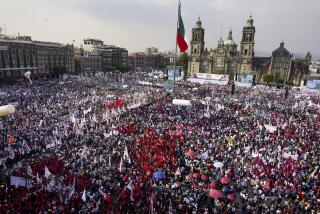Sanity in Costa Rica
- Share via
In keeping with a proud tradition that is unique in Central America, the citizens of Costa Rica peacefully elected a new president last weekend. In choosing between two candidates who both distrust the Sandinistas in neighboring Nicaragua, Costa Ricans thoughtfully opted for a man who offered a peaceful approach rather than hawkish rhetoric.
Oscar Arias Sanchez will succeed his fellow National Liberation Party member Luis Alberto Monge into San Jose’s presidential palace. Arias, like Monge, has no illusions about the problems posed by Nicaragua’s revolutionary government for the rest of Central America. But unlike his election opponent Rafael Angel Calderon, Arias did not promise to send Costa Rica’s poorly-armed border guards in pursuit of Sandinista troops if there were more border incidents like those that have strained relations between the two nations in recent years.
More than anything else in the Costa Rican campaign, it was Calderon’s hot-headed posturing against Nicaragua that convinced the electorate to support Arias in an otherwise close race between middle-of-the-road candidates. That is a hopeful indicator not just for Costa Rica, but for all of Central America. If Arias now joins Guatemala’s newly-elected President Vinicio Cerezo in an effort to begin a dialogue among the new leaders of Central America’s five governments--and especially if he helps Cerezo revive the stalled Contadora Group peace negotiations--the Central American crisis may yet be settled without further bloodshed or a heavy-handed and disastrous U.S. intervention.
Of course, Arias must be concerned with issues other than his country’s relations with Nicaragua. Costa Rica is beset with the same domestic financial difficulties--foreign debt, rising inflation, poverty and rising unemployment--that plague other Latin American nations. But if he helps reduce the danger of a regional war in Central America, the other problems will be easier for Arias to tackle.
More to Read
Sign up for Essential California
The most important California stories and recommendations in your inbox every morning.
You may occasionally receive promotional content from the Los Angeles Times.










